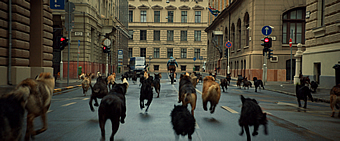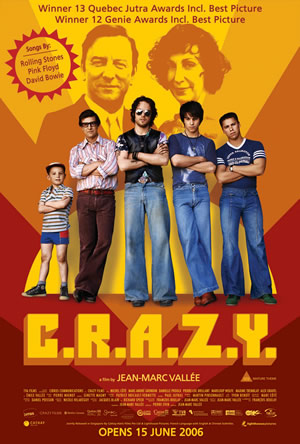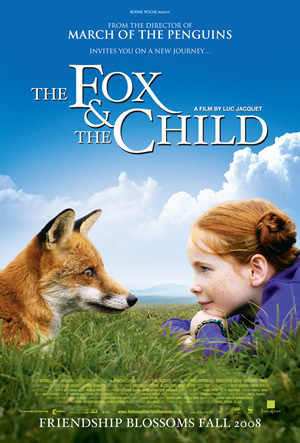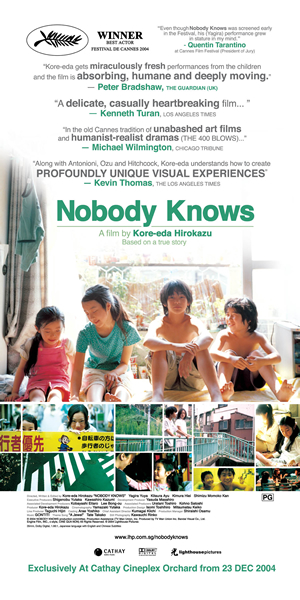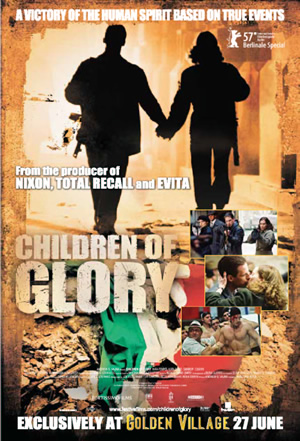WHITE GOD (Feher Isten) (2014)
Genre: Drama
Director: Kornél Mundruczó
Cast: Zsofia Psotta, Luke And Boy, Sandor Zsoter, Szabolcs Thuroczy, Lili Monori, Laszlo Galffi, Lili Horvath
RunTime: 2 hrs 1 min
Rating: NC-16 (Coarse Language & Some Violence)
Released By: Golden Village Pictures & Lighthouse Pictures
Official Website:
Opening Day: 26 March 2015
Synopsis: Winner of the Un Certain Regard Prize at the 2014 Cannes Festival, Kornel Mundruczó’s newest film is a story of the indignities visited upon animals by their supposed human superiors, but it’s also a brutal, beautiful metaphor for the political and cultural tensions sweeping contemporary Europe. When young Lili is forced to give up her beloved dog Hagen because its mixed-breed heritage is deemed “unfit” by The State, she and the dog begin a dangerous journey back towards each other. At the same time, all the unwanted, unloved and so-called “unfit” dogs rise up under a new leader, Hagen, the one-time housepet who has learned all too well from his “Masters” in his journey through the streets and animal control centers how to bite the hands that beats him...
Movie Review:
Few films took us by surprise the way ‘White God’ did, and we mean that entirely as a compliment. Winner of the Un Certain Regard prize at the Cannes Film Festival last year, it imagines a dystopia where man’s best friend is turned into man’s worst enemy after being subject to the cruelty of his ways, culminating in a canine uprising that sees them turn against their human abusers in the same brutal ways that they were treated before. Oh yes, it’s an underdog tale all right, but one that gives new meaning to the saying that ‘every dog has his day’.
The leader of the pack is one of two key subjects in Kornel Mundruczo’s bracingly original film, who starts off as the four-legged best friend of his other subject, a 13-year-old teenage girl named Lili (Zsofia Psotta). While her mother is sent abroad for a work trip, Lili is sent to spend three summer months with her surly father, Daniel (Sandor Zsoter). Divorced from Lili’s mother, Daniel is ill-prepared for the unexpected reunion between father and daughter, much less to accommodate her cross-breed mongrel she names Hagen in his apartment. When an irascible neighbour calls the authorities to enforce the state-wide tax on impure breeds, Daniel dumps the animal on the side of the road, that single act setting in motion a whole chain of events which will bring the human-canine relationship to its heels (or should we say, paws) .
Mundruczo spends a good part of the first act developing not just the prickly relationship between Lili and Daniel but also the bond between Lili and Hagen; in particular, a nail-biting scene during Lili’s band practice in school where we wait with tenterhooks for the moment when Hagen will burst out of the closet where Lili has left him underscores the extent to which Lili would go in order to keep the pooch. That this first part unfolds pretty much like a typical Hollywood movie between man and his best friend (think ‘Lassie’ or ‘Marley and Me’) is pure genius, because that familiarity only makes what follows in the subsequent acts even more disquieting.
Upon Hagen’s abandonment, Mundruczo splits the narrative into two parallel halves. On one hand, Hagen starts to associate with the other strays roaming the streets, looking for scraps amidst the trash at the back alley of meat shops at the Central Market and avoiding capture by the city’s animal control – but what truly takes the narrative in a different direction is his adoption by a ferrety dog fighter who sharpens Hagen’s teeth, feeds him steroids and other cocktails and trains him to be a merciless killing machine. And oh, the said fighter renames him Maxi after stripping and whipping what heart was inside Hagen in the first place.
On the other, Lili charts her own rebellious course to defy her father, hanging out with her bandmates at late-night parties in the hope of catching the attention of a particular boy she seems interested in. Her path of self-destruction comes to a head when she is found with a stash of drugs in her pocket during a raid by the police on one of these rave parties. Whereas many commentators have focused on the more sensational half of the film, you will also find within a touching story of reconciliation between father and daughter that is meant to complement Hagen/ Maxi’s own search for love and acceptance in a cruel and unflinching environment.
Their fates become intertwined yet again in the stunning finale, which begins with Hagen’s impending execution, his vicious escape from the clutches of his executioner, and his emancipation of his fellow hounds bound for a similar end. The production notes say that a total of 274 real dogs were trained for this thrilling climax, and let’s just say it looks as awesome as it sounds. The feat is not just in the choreography (courtesy of head trainer Teresa Ann Miller) but also in its cinematography, where against emptied streets of Budapest we experience the reign of terror of the canine mutiny as packs of bloodthirsty mutts go after each and every human who has transgressed against them before. It is impossible to convey the awe and aura of these scenes; rather, you’re best off witnessing them for yourself and bearing in mind that they were filmed completely without any CGI.
Certainly, such animal uprisings are not new to literature, and Mundruczo’s revisionist fable with thematic similarities to the classic ‘Animal Farm’ is in fact meant as allegory to the persecution of the “other” in real-life Prime Minister Viktor Orban's Hungary, where outsiders are regarded and treated no better than dogs. Though Mundruczo follows too faithfully the tropes of a typical revenge thriller in Hagen’s persecution of his enemies, there is no doubting the power and resonance of his emotional finish, especially as how it comes full circle to the very intimate bond that it led with in the first place.
Proving that there is no need for motion capture when you have the right non-human actor or actors, real-life mutt twins Body and Luke convey an astonishing range of emotions through their facial expressions and expressive eyes, which run the gamut from fear to loneliness to grit to anger and of course love. Newcomer Psotta is also a revelation as Lili, her performance a terrific combination of innocence, angst and eventually maturity. Thanks to his actors, both human and canine alike, there is more than just artifice to Mundruczo’s film, which we guarantee will put you through an emotional wringer.
Indeed, ‘White God’ is one of the most extraordinary pieces of filmmaking we’ve seen in recent years, original in the way it reinvents classic themes of love, cruelty, vengeance and redemption in a dystopian light and audacious in the way that it executes its vision. There is of course allegory about oppression and the underdog, but even if you don’t get the subtext, you will still be transfixed from start to finish by its gripping blend of gritty realism and breath-taking fantasy.
Movie Rating:




(A strikingly original dystopia reminiscent of ‘Animal Farm’, this gripping drama of love, cruelty, vengeance and redemption is an extraordinary feat of filmmaking)
Review by Gabriel Chong
You might also like:
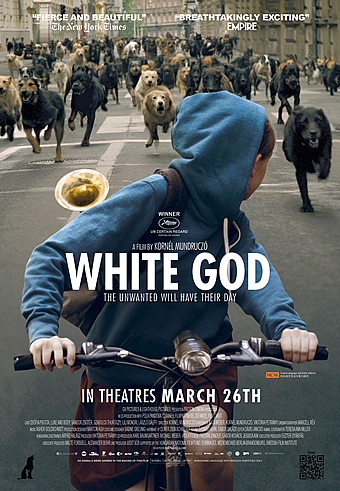
Movie Stills


